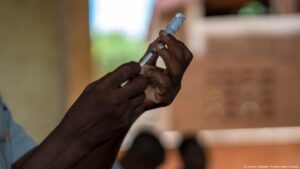Led by Jonathan Parr, MD, MPH, with Jon Juliano, MD, MSPH, and researchers in the Infectious Disease Epidemiology and Ecology Lab (IDEEL), the UNC Institute for Global Health and Infectious Diseases has been awarded a $3.6 million NIH R01 grant to study the rise of drug-resistant malaria in Ethiopia, with partners at the Ethiopian Public Health Institute (EPHI), Brown University, University of Notre Dame, and Imperial College London.

Ethiopia is Africa’s second most-populated country with an estimated 60% of its population at risk for malaria exposure. Plasmodium falciparum infection accounts for the majority of malaria deaths and approximately 70% of all cases. Artemisinin-based combination therapies (ACTs) have been critical to the success in reducing the global burden of falciparum malaria between 2000 and 2015. But the emergence and spread of artemisinin-resistant falciparum malaria has become a major threat to global elimination.
“Ethiopia has made meaningful gains in the fight against malaria. However, the malaria parasite has a long history of evolving to survive, and it appears to be doing just that,” said Jonathan Parr, MD, MPH, assistant professor of medicine in infectious diseases.
The project “Epidemiology and Determinants of Emerging Artemisinin-Resistant Malaria in Ethiopia,” has been awarded NIH R01 funding, and builds upon UNC’s strong partnership with the Ethiopian Public Health Institute (EPHI), the technical arm of the Ethiopia Federal Ministry of Health. The project also includes partners at Brown University, University of Notre Dame, and Imperial College London. Parr describes the study as an exciting opportunity to use cutting-edge, multidisciplinary science in the fight against malaria.

“We will be sequencing parasites from a network of sites across the country, conducting laboratory experiments, and performing predictive modeling to understand how dangerous new strains of malaria emerge and spread.”
Ashenafi Assefa, PhD, who trained as a UNC postdoctoral trainee in Dr. Parr’s group and has years of experience conducting translational malaria research, will lead study activities in Ethiopia, training personnel and running assays, while overseeing protocol implementation and data collection. Assefa says the research outcomes will contribute to the advancement of scientific knowledge in the field.
“This study is expected to generate critical evidence about the rise and expansion of drug-resistant parasites in the region,” said Assefa. “The results will be readily consumed by policymakers and advance malaria elimination efforts in Ethiopia and beyond.”
Collaborating with EPHI, researchers will conduct surveys of people presenting to health facilities with falciparum malaria across Ethiopia to characterize resistant parasites. These results will be integrated into a point-of-care clinical tool for identifying individuals with drug-resistant falciparum malaria. The results will also guide the development of a model to predict the future spread of resistance mutations.
Jon Juliano, MD, MSPH, heads IDEEL, an interdisciplinary research collaboration that explores how pathogens interact with human hosts, with a focus on malaria.
“We are entering a period of great concern about the effectiveness of antimalarial drugs in East Africa. The emergence of partial artemisinin resistance in multiple countries in the Rift Valley raises concerns about the long-term utility of these first line agents. This project represents a significant extension of studies to understand the emergence and spread of these mutations that the University of North Carolina is either leading or supporting in Rwanda, Uganda, Tanzania, the Democratic Republic of the Congo and now Ethiopia.”
The UNC Institute for Global Health and Infectious Diseases (IGHID) is an engine for global health research and pan-university collaboration, transforming health in North Carolina and around the world. IGHID facilitates research excellence while providing opportunities for investigators to nurture emerging scientists through training and service, to achieve positive patient care outcomes and practice.
